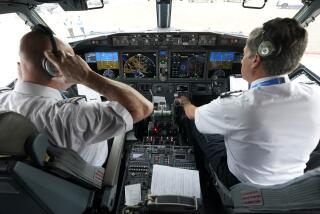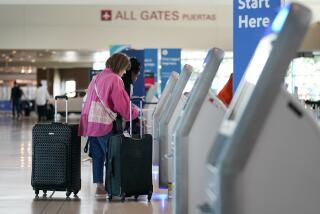Pilots Decry Age-60 Forced Retirement in Show of Zest
WASHINGTON â Commercial airline pilots who oppose mandatory retirement at age 60 displayed youthful zest Wednesday as they packed a hearing room to lobby the government for a new policy.
The pilots, who contend that economics and not passenger safety is behind the 34-year-old rule, gave a standing ovation to one of their colleagues and jeered former Federal Aviation Administration chief Langhorne Bond when he spoke in favor of keeping the regulation.
âThis room is filled with pilots able to fly past 60,â Bond conceded at the FAA hearing in a Capitol Hill hotel. But he said the group at the hearing was not a fair cross-section of older pilots.
People experience reduced mental acuity as they age, Bond said. And, he continued, common sense dictates that pilots--as a group--have slower reaction time, disturbed sleep and less memory retention as they age.
âIf a pilot can demonstrate he can safely fly after 60, he should be able to,â Bond said. But, he added, there are no reliable tests to measure deterioration with age.
FAA Administrator David Hinson said he has an open mind on the age-60 rule.
âI have no preconceived ideas about the outcome of this meeting,â said Hinson, 60, himself a longtime pilot.
Most witnesses at the hearing called for raising the age-60 limit or eliminating age restrictions. They said barring commercial pilots from flying past age 60 is a vestige of bias that is outmoded.
Joseph Ritorto, head of the Teterboro, N.J., Airport Air Traffic Committee, got a standing ovation after he suggested that being 60 today is not what it used to be when older people were less active. âWith age we do gather judgment and acquired instincts,â he said.
Bert Yetman, president of the Professional Pilots Federation, said: âAge discrimination is no longer tolerated in our society. I am ready to fly. I am willing to fly. I am able to fly.â
Yetman, a former Air Force pilot in Vietnam, said he was forced to retire a year ago when he was 60. âI fly a desk today,â he said.
But those who favor keeping the current age limit said passenger safety should not be put at risk without hard medical evidence.
Richard LaVoy, president of the Allied Pilots Assn., said: âThe public must be protected. All other considerations must be secondary. There is a known degradation of physical and cognitive functions with aging.â
The Airline Pilots Assn., which once opposed the age limit and fought it unsuccessfully in court, now supports the rule. But many at Wednesdayâs hearing accused the association of changing its position because it is now controlled by younger pilots who fear loss of their jobs.
More to Read
Inside the business of entertainment
The Wide Shot brings you news, analysis and insights on everything from streaming wars to production â and what it all means for the future.
You may occasionally receive promotional content from the Los Angeles Times.










